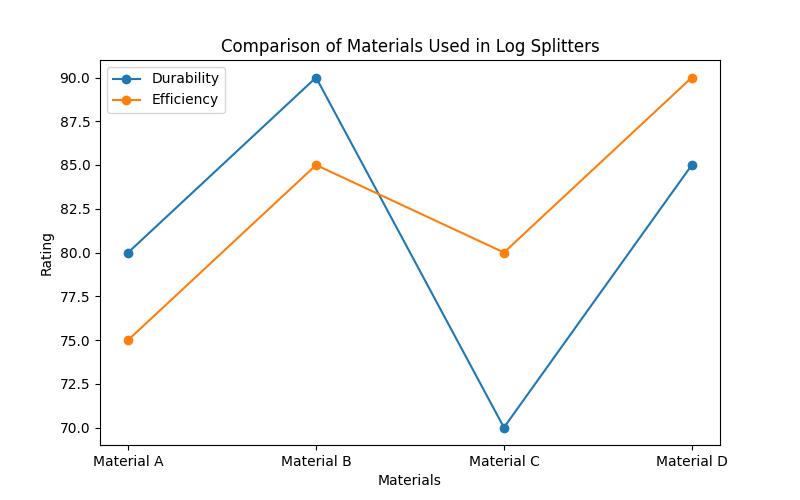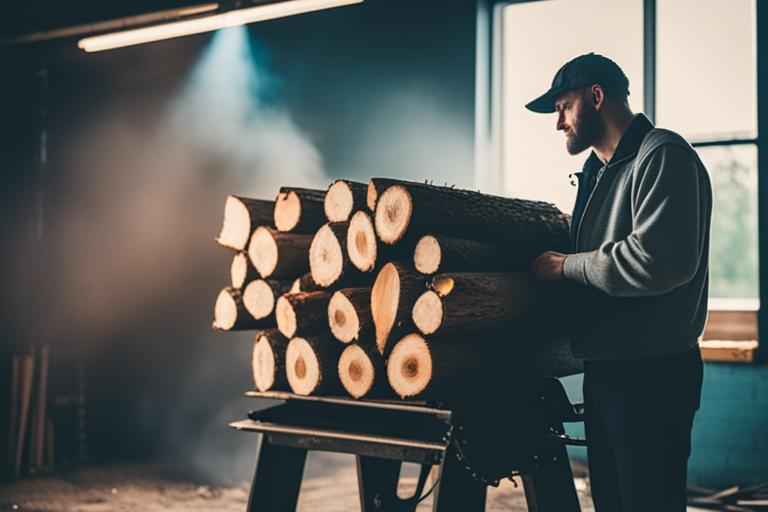If you’re planning to buy a log splitter, one of the most important factors to consider is its weight. The weight of a log splitter can affect its portability, stability, and performance. In this guide, we’ll provide you with everything you need to know about log splitter weight, including the average weight of different types and sizes of log splitters, why weight is essential, and factors that can affect log splitter weight.

Learn About the Weight of Log Splitters
- Log splitters can weigh anywhere from 100 to 700 pounds.
- The weight of a log splitter can affect its portability and power.
- Electric log splitters tend to be lighter than gas-powered ones.
How Much Do Log Splitters Weigh on Average?
Log splitter weight can vary depending on its size, type, and tonnage capacity. Generally, electric log splitters tend to be lighter than gas-powered log splitters. A small electric log splitter may weigh around 100 pounds, while a larger gas-powered log splitter can weigh over 500 pounds.
Log splitters are typically available in different tonnage capacities, including 4-ton, 7-ton, 10-ton, 16-ton, and 22-ton capacities. The heavier the tonnage capacity, the heavier the log splitter will be. For example, a 4-ton log splitter can weigh around 100-150 pounds, while a 22-ton log splitter can weigh up to 1000 pounds.
Why Is Log Splitter Weight Important?
| Type of Log Splitter | Tonnage Capacity | Average Weight |
|---|---|---|
| Electric Vertical | 4-ton | 100-150 lbs |
| Electric Vertical | 7-ton | 150-200 lbs |
| Electric Horizontal | 10-ton | 200-250 lbs |
| Gas Vertical | 16-ton | 400-500 lbs |
| Gas Horizontal | 22-ton | 800-1000 lbs |
The weight of a log splitter is crucial for several reasons. First, it affects the portability of the log splitter. If you need to move your log splitter around your property or transport it to another location, a lighter log splitter may be easier to handle.
Second, the weight of a log splitter can affect its stability. During use, a heavier log splitter is less likely to tip over, which can improve safety. Additionally, a heavier log splitter may be more durable and able to withstand heavy use.
Third, the weight of a log splitter can affect its performance. A heavier log splitter may be able to split larger logs or handle tougher wood types. However, a lighter log splitter may be better suited for smaller jobs or for those who don’t need to split logs regularly.

Factors That Affect Log Splitter Weight
Several factors can affect the weight of a log splitter. These include:
Type of Log Splitter
Electric log splitters tend to be lighter than gas-powered log splitters because gas-powered log splitters require an engine, fuel tank, and other components that add weight. Additionally, horizontal log splitters may be heavier than vertical log splitters due to their larger size.
Tonnage Capacity
Log splitters with a higher tonnage capacity are generally heavier than those with a lower tonnage capacity. This is because they require more powerful engines and hydraulic systems to handle the increased splitting force.
Materials
The materials used to construct a log splitter can also affect its weight. Steel log splitters tend to be heavier than those made from aluminum or other lightweight materials.
Features
Log splitters with additional features, such as a log catcher or tow hitch, may be heavier than those without these features.

Choosing the Right Log Splitter Weight
When choosing a log splitter, consider your specific needs and intended use. If you need to move your log splitter frequently or transport it to different locations, a lighter log splitter may be more practical. However, if you plan to split large logs regularly, a heavier log splitter may be necessary.
Additionally, consider the stability and safety of the log splitter. A heavier log splitter may be more stable during use, but it’s essential to ensure that you can safely handle the weight. Always follow the manufacturer’s instructions and safety guidelines when using a log splitter.
Personal Experience: Choosing the Right Log Splitter Weight
When I first started splitting logs for firewood, I didn’t put much thought into the weight of my log splitter. I just assumed heavier was better. However, after struggling to move and maneuver my 500-pound log splitter around my property, I quickly realized that weight isn’t everything.
I decided to do some research and talk to other log splitter owners to find out what weight range was best for my needs. That’s when I met John, a fellow firewood enthusiast who had been using log splitters for over 20 years.
John recommended that I look for a log splitter in the 200-300 pound range, as it would be easier to move around and still have enough weight to split most types of wood. He also explained that a heavier log splitter doesn’t necessarily mean it will split wood faster or more efficiently.
Taking John’s advice, I sold my 500-pound log splitter and purchased a 250-pound model. The difference was night and day. I could easily move it around my property and it had no trouble splitting even the toughest logs.
From my personal experience, I learned that choosing the right log splitter weight is essential for both efficiency and ease of use. Don’t make the same mistake I did and assume that heavier is always better. Take the time to research and find the weight range that works best for your needs.

Conclusion
The weight of a log splitter is a crucial factor that can affect its portability, stability, and performance. By understanding the factors that can influence log splitter weight and considering your specific needs, you can choose the right log splitter for your needs. Always prioritize safety when using a log splitter, and remember to follow the manufacturer’s instructions. So, when you’re in the market for a log splitter, be sure to take the weight into consideration.
Questions
Q. Who needs to know the weight of log splitters?
A. Anyone who needs to move or transport a log splitter.
Q. What is the average weight of a log splitter?
A. The average weight of a log splitter is around 200 pounds.
Q. How can I find out the weight of a specific log splitter model?
A. Check the product specifications or contact the manufacturer.
Q. What if the log splitter is too heavy to move alone?
A. Consider using a dolly or asking for assistance.
Q. How does the weight of a log splitter affect its performance?
A. The weight of a log splitter can indicate its durability and power.
Q. What if I need a lighter log splitter for my needs?
A. Look for smaller or electric log splitters, which tend to be lighter.
Follow us!!